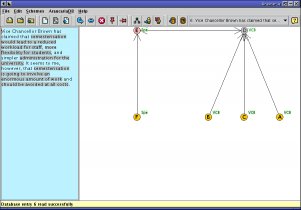Table of Contents
Araucaria
 Araucaria is a software tool for analysing arguments. It aids a user in reconstructing and diagramming an argument using a simple point-and-click interface. The software also supports argumentation schemes, and provides a user-customisable set of schemes with which to analyse arguments.
Araucaria is a software tool for analysing arguments. It aids a user in reconstructing and diagramming an argument using a simple point-and-click interface. The software also supports argumentation schemes, and provides a user-customisable set of schemes with which to analyse arguments.
Once arguments have been analysed they can be saved in a portable format called “AML”, the Argument Markup Language, which is based on XML. XML is a flexible language which can easily be used to generate web pages and data with which to populate a database. The definition of AML is available in the file argument.dtd.
Araucaria has been designed with the student, instructor, and researcher in mind. It is sufficiently straightforward to be useful to students learning how to reconstruct arguments, diagram them, and apply argumentation schemes. It is sufficiently flexible for instructors to provide their own examples, sample analyses, and alternate sets of argumentation schemes. Finally, it is also sufficiently powerful to be of use in research, particularly in providing examples of argument analyses to support claims.
Araucaria is a collaborative project between Chris Reed and Glenn Rowe in the Argumentation Research Group at the School of Computing, University of Dundee.
News
- 10th September 2009
- The araucaria project has been moved to a new server. There may be some intermittent teething problems as things settle.
- AraucariaDB updates from within the Araucaria software are currently non-functioning. The AraucariaDB corpus (and Polish and other extensions), however, are accessible online as a part of the Argument Web which can be searched from AIFdb.
- 07-Sep-2009:We had a power supply failure over the weekend which interrupted database availability. The problem is now fixed. We will be migrating to a new server this week, so brief service failure is possible.
- 21-May-2008:We had a disk failure some time last week which interrupted database availability. The problem is now fixed.
- 28-Nov-2007:Slight hiccup with the server this morning, now rectified.
- 27-Jun-2006: We are at ISSA 2006 where we are releasing the all new Version 3.1 with support for Wigmore diagrams
- 12-Jan-2006: Power outages all over the city today, playign havoc with our servers.
- 23-Sep-2005: Another campus-wide power outage scheduled for Sunday 25 Sep 1000-1700
- 12-Sep-2005: Power down all over campus on Friday, so server outage. Also, some versions of Araucaria cannot currently access the DB (though web access is fine). We are working on a solution.
- 31-Aug-2005: With our move to a new building, the server has been obliged to change its IP address to 134.36.36.33. There may be problems with DB access over the next few days.
- 18-May-2005: Version 3.0 is now available for download. CDs will also be available at OSSA 2005.
- 13-May-2005: Server failures beyond our control have lead to some service disruption. Back to normal now.
- 07-Feb-2005: Hardware failures on campus have led to many outages over the past fortnight. Now fixed.
Download
Araucaria is written in Java, which means that it runs on most computers, including all versions of Windows, UNIX and Linux, Macs*, and so on. The software is free (it is released under the GNU General Public License) and version 3.1 is now available for download.
Araucaria Argumentation Corpus
Access to AraucariaDB, the online repository of arguments, is now available not only through Araucaria, but also through a flexible search engine. It is constructed from examples drawn from a wide range of online resources.
Update 12/11/12: For technical reasons, we have had to suspend the use of individual usernames when logging in to AraucariaDB from within Araucaria. If you wish to browse existing analyses or save your own, please use the username araucaria.

